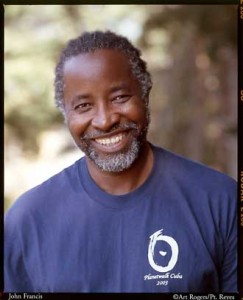 John Francis is an American environmentalist and UN Peace Ambassador nicknamed the Planetwalker. After witnessing the devastation caused by a 1971 oil spill in San Francisco Bay, Francis stopped riding in motorized vehicles, a vow that lasted 22 years, from 1972 until 1994. From 1973 until 1990, he also spent 17 years voluntarily silent. During this time he earned a PhD in land management and traveled extensively, walking across the entire width of the lower 48 of the United States as well as walking to South America.
John Francis is an American environmentalist and UN Peace Ambassador nicknamed the Planetwalker. After witnessing the devastation caused by a 1971 oil spill in San Francisco Bay, Francis stopped riding in motorized vehicles, a vow that lasted 22 years, from 1972 until 1994. From 1973 until 1990, he also spent 17 years voluntarily silent. During this time he earned a PhD in land management and traveled extensively, walking across the entire width of the lower 48 of the United States as well as walking to South America.
On Jan. 28, Francis will deliver the keynote address of the 2010 Desautels Business Conference on Sustainability. For more information regarding the conference (running from Jan. 28-30) email info@mcgilldbcs.com or go to www.mcgilldbcs.com.
Q: Your period of silence and not riding in motorized vehicles coincided with your own academic journey (BA Southern Oregon University, MA from the University of Montana, and finally a PhD in Land Management from the University of Wisconsin-Madison). During your travels by foot from school to school, you had time to reflect on your next step and align your studies with personal values. Do you feel that students today are rushing out with degrees too quickly?
Each time I finished a degree while silent, I promised myself that I wouldn’t go to school again while not speaking because it was so difficult. But after a year or so of work and/or walking I would get to a place where I wanted to know more. So in a very organic way I yearned for the kind of formal learning that comes from College and an academic community. For me I think I gained more by academic learning interspersed with as much non-formal experiential learning, but I think that we are all different, as well as our circumstances.
Should we be teaching how to treat one another in the classroom, or is this something individuals should seek on their own?
After walking across America with years of informal and formal education in environmental studies, I arrived at what seemed a simple truth, that if we are part of the environment, then how we treat each other is our first opportunity to treat the environment in a sustainable way, or in our relationships, understand what sustainability might mean. It is this understanding that prompted me to begin speaking, so I of course think it is something that individually we can practice. As a formal course, I think it could be taught within environmental ethics and philosophy.
Do you have any advice for those who are passionate about a particular issue, but hesitant to ‘go against the grain’ of societal norms?
Passion is good, because it can help sustain you on your journey. Taking the first step can be difficult even with passion, if it looks like you are going to be alone in your mission. But often that is the nature of change. Still, none of us can tell the future, as to what obstacles or opportunities will arise once we commit ourselves to a certain action. It is important that once we embark on our journey, we choose a time to revisit our decision, based on where we have reached and/or what we have learned.
What do you have to say to critics who think one person can’t effect change in this world? Has your TED talk fame, the UN ambassador appointment and extensive media exposure allowed people to take notice and strengthen the impact of your message?
I can’t imagine anything that we do that will not have its critics; they do have a place in helping to move us forward. For me I spent 17 years listening and being open to learn from everyone, including critics. As to whether exposure in the media has “strengthened the impact” of my message, I would hope so, but more important is strengthening the message through living.
